Related Research Articles
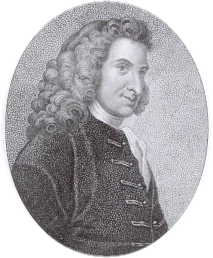
Henry Fielding was an English novelist, ironist and dramatist known for earthy humour and satire. His comic novel Tom Jones is still widely appreciated. He and Samuel Richardson are seen as founders of the traditional English novel. He also holds a place in the history of law enforcement, having used his authority as a magistrate to found the Bow Street Runners, London's first intermittently funded, full-time police force.

Robert Walpole, 1st Earl of Orford, was a British statesman and Whig politician who is generally regarded as the de facto first Prime Minister of Great Britain.
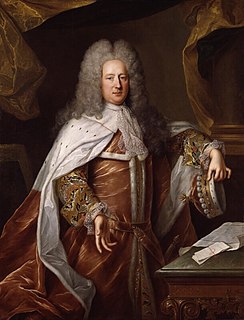
Henry St John, 1st Viscount Bolingbroke was an English politician, government official and political philosopher. He was a leader of the Tories, and supported the Church of England politically despite his antireligious views and opposition to theology. He supported the Jacobite rebellion of 1715 which sought to overthrow the new king George I. Escaping to France he became foreign minister for the Pretender. He was attainted for treason, but reversed course and was allowed to return to England in 1723. According to Ruth Mack, "Bolingbroke is best known for his party politics, including the ideological history he disseminated in The Craftsman (1726–1735) by adopting the formerly Whig theory of the Ancient Constitution and giving it new life as an anti-Walpole Tory principle."

William Pulteney, 1st Earl of Bath, was a British Whig politician who sat in the House of Commons from 1707 to 1742, when he was created the first Earl of Bath by King George II.
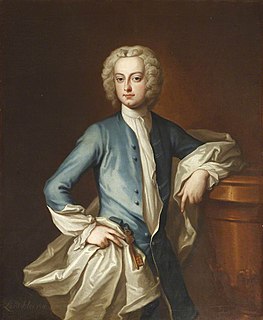
John Hervey, 2nd Baron Hervey was an English courtier and political writer. Heir to the Earl of Bristol, he obtained the key patronage of Walpole, and was involved in many court intrigues and literary quarrels, being apparently caricatured by Pope and Fielding. His memoirs of the early reign of George II were too revealing to be published in his time and did not appear for more than a century.
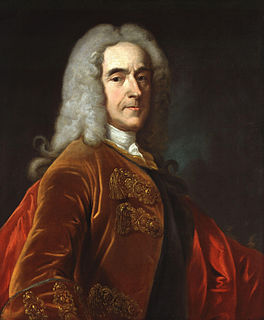
Field Marshal Richard Temple, 1st Viscount Cobham was a British soldier and Whig politician. After serving as a junior officer under William III during the Williamite War in Ireland and during the Nine Years' War, he fought under John Churchill, 1st Duke of Marlborough, during the War of the Spanish Succession. During the War of the Quadruple Alliance Temple led a force of 4,000 troops on a raid on the Spanish coastline which captured Vigo and occupied it for ten days before withdrawing. In Parliament he generally supported the Whigs but fell out with Sir Robert Walpole in 1733. He was known for his ownership of and modifications to the estate at Stowe and for serving as a political mentor to the young William Pitt.
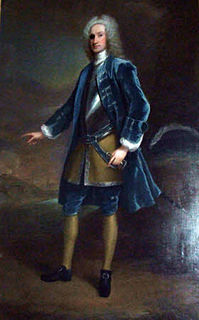
Field Marshal Sir Robert Rich, 4th Baronet was a British cavalry officer. As a junior officer he fought at the Battle of Schellenberg and at the Battle of Blenheim during the War of the Spanish Succession. He was then asked the raise a regiment to combat the threat from the Jacobite rising of 1715. He also served with the Pragmatic Army under the Earl of Stair at the Battle of Dettingen during the War of the Austrian Succession. As a Member of Parliament he represented three different constituencies but never attained political office.

Edmund Gibson was a British divine who served as Bishop of Lincoln and Bishop of London, jurist, and antiquary.

Samuel Sandys, 1st Baron Sandys, was a British Whig politician who represented Worcester in the House of Commons from 1718 until 1743, when he was created Baron Sandys. He held numerous posts in the government of the United Kingdom, namely Chancellor of the Exchequer, Leader of the House of Commons, Cofferer of the Household and First Lord of Trade. He was also a justice in eyre.
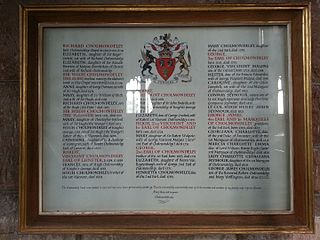
George Cholmondeley, 3rd Earl of Cholmondeley,, styled as Viscount Malpas from 1725 to 1733, was a British Whig politician who sat in the House of Commons from 1724 to 1733.

Charlotte Charke was an English actress, playwright, novelist, autobiographer, and noted transvestite. She acted on the stage from the age of 17, mainly in breeches roles, and took to wearing male clothing off the stage. She assumed the name "Charles Brown" and called her daughter "Mrs. Brown." She suffered a series of failures in her business affairs after working in a variety of trades commonly associated with men, from valet, to sausage maker, farmer, pastry chef, and tavern owner, but finally achieved success under her own name as a writer, ending her life as a novelist and memoirist.
The Patriot Whigs, later the Patriot Party, were a group within the Whig Party in Great Britain from 1725 to 1803. The group was formed in opposition to the government of Robert Walpole in the House of Commons in 1725, when William Pulteney and seventeen other Whigs joined with the Tory Party in attacks against the ministry. By the mid-1730s, there were over one hundred opposition Whigs in the Commons, many of whom embraced the Patriot label. For many years, they provided a more effective opposition to the Walpole administration than the Tories were.

Sir Wilfrid Lawson, 3rd Baronet of Isell FRS was a British politician who sat in the House of Commons from 1718 to 1737.
The Golden Rump is a farcical play of unknown authorship said to have been written in 1737. It acted as the chief trigger for the Theatrical Licensing Act of 1737. The play has never been performed on stage or published in print. No manuscript of the play survives, casting some doubt over whether it ever existed in full at all. The authorship of the play has often been ascribed to Henry Fielding, at that time a popular and prolific playwright who often turned his incisive satire against the monarch George II and particularly the "prime minister" Sir Robert Walpole. Modern literary historians, however, increasingly embrace the opinion that The Golden Rump may have been secretly commissioned by Walpole himself in a successful bid to get his Bill for theatrical licensing passed before the legislature.

James Peirce (1674?–1726) was an English dissenting minister, the catalyst for the Salter's Hall controversy.
Richard Baron was a dissenting minister, Whig pamphleteer, and editor of Locke, Milton and others.
Thomas Gore of Dunstan Park, Berkshire, was a British politician who sat in the House of Commons between 1722 and 1768.
Admiral Philip Cavendish of Westbury, Hampshire, was a Royal Navy officer and politician who sat in the House of Commons between 1721 and 1743. He went on to be Commander-in-Chief, Portsmouth.
Henry Cunningham, of Boquhan, Gorgunnock, Stirling, was a Scottish Whig politician who sat in the House of Commons from 1709 to 1734. He was given the post of Governor of Jamaica, but died two months after landing there. A description of Cunningham appears in the introduction to Scott’s historical novel ‘’Rob Roy’’.
Thomas Walker, of Wimbledon, Surrey, was a British Whig politician who sat in the House of Commons between 1733 and 1747.
References
![]() This article incorporates text from a publication now in the public domain : Stephen, Leslie, ed. (1885). "Arnall, William". Dictionary of National Biography . 2. London: Smith, Elder & Co.
This article incorporates text from a publication now in the public domain : Stephen, Leslie, ed. (1885). "Arnall, William". Dictionary of National Biography . 2. London: Smith, Elder & Co.
- 1 2 3 4 Carter, Philip (2004). "Arnall, William". Oxford Dictionary of National Biography . Oxford University Press. Retrieved 14 October 2010.